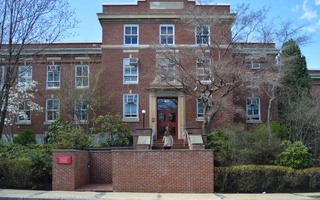Three days after the North Koreans crossed the 38th parallel last June, the Harvard University Press scooped the nation's publishers with the only current book on Korea, George McCune's "Korea Today." Thomas J. Wilson, director of the university Press, admits it was coincidence. But in recent years the Press has encouraged books on world trouble-spots.
Yet this is not the only field that the University Press emphasizes. Any non-fiction work that "will advance learning," regardless of its potential market, has a chance of being published, if the Board of Syndies approves. Nine professors, representing the main branches of learning, sit on the Board of Syndies for terms of four years.
Before a manuscript reaches these Syndies for approval, it is first read by one or more staff members of the Press. Then at least one and maybe two opinions are obtained from scholars on the particular subject. Manuscripts that receive favorable opinions as to style and authority of content are given to the Syndics for their acceptance.
Present Syndics
The present Syndics from the College are John O. Brew, director of Peabody Museum, Mason Hammond '25, professor of Greek and Latin, Oscar Handlin, professor of American History, Howard Mumford Jones, professor of English, Paul C. Mangelsderf, professor of Botany, Donald H. Menzel, professor of Astronomy, and Samuel A. Stouffer, professor of Sociology.
The Law School is represented by Mark D. Hoe '28, professor of Law, and the Medical School by A. Baird Hastings, Hamilton Kuhn Professor of Clinical Biology.
The Syndics may accept a book that is well-written and authoritative, but the Board of Directors must then pass on its financial soundness.
The Board of Directors is composed of persons with business experience in or out of the University. It is presided over by Administrative vice-President Reynolds. Three other men are appointed for year terms and are usually reappointed annually.
It is their job to supervise the overall financial policy of the Press. Although commercial publishing houses are in business to make a profit, the Press is a service organizations. The directors must only make sure it breaks even.
To do this, a close check is kept on the 90 or so books that are published annually. The Syndics can usually judge whether a book will sell enough copies to pay for itself. And they pass this opinion on to the Board of Directors.
If it is felt that a book will not have a wide audience appeal, assistance must come from sources other than the Press funds. Usually, these subsidies are given by the author, the department concerned, or an interested patron.
Commercial publishers have virtually withdrawn from putting out books that do not promise a sale of 10,000 copies or more. But the Press will publish worthwhile manuscripts from its own funds that will sell only 3,500 copies but still break even.
Specialized Audience
Profits from bestsellers help to finance deserving books for a highly specialized reader. Poetry books, such as Theodore Spencer's "An Acre in the Seed," do well to sell 1000 copies. Technical hooks that are expensive to produce, as "Early New England Potters and Their Wares" by Lura Woodside Watkins, must have a high retail price. Some of them are subsidized as well.
Not all the Press's books are headaches from the financial angle. "The Report on General Education in a Free Society" has already soared to over 40,000 sales and is still going strong. President Conant's "Education in a Divided World" has passed the 15,000 mark, and Sigfried Giedion's "Space, Time, and Architecture," has gone over 20,000 copies.
Read more in News
Cambridge Police Okay Square Football RalliesRecommended Articles
-
Publish Popular Or PerishThe halcyon days of academic publishing, if they ever existed, are now days of serious-minded business. More than ever, the
-
Harvard Press Was Told Of Book's CIA BackingThe director of the Harvard University Press, which published a book by Nadav Safran without mention of its CIA sponsorship,
-
A HARVARD UNIVERSITY PRESS.The need for a non-commercial printing press in the United States is widely felt and acknowledged. Many valuable writings by
-
Wilson to Take Over University Press This July; Succeeds ScaifeThomas J. Wilson will assume directorship of the University Press beginning July 1, the University announced last night. He succeeds
-
 Printing in the Digital Age
Printing in the Digital Age













